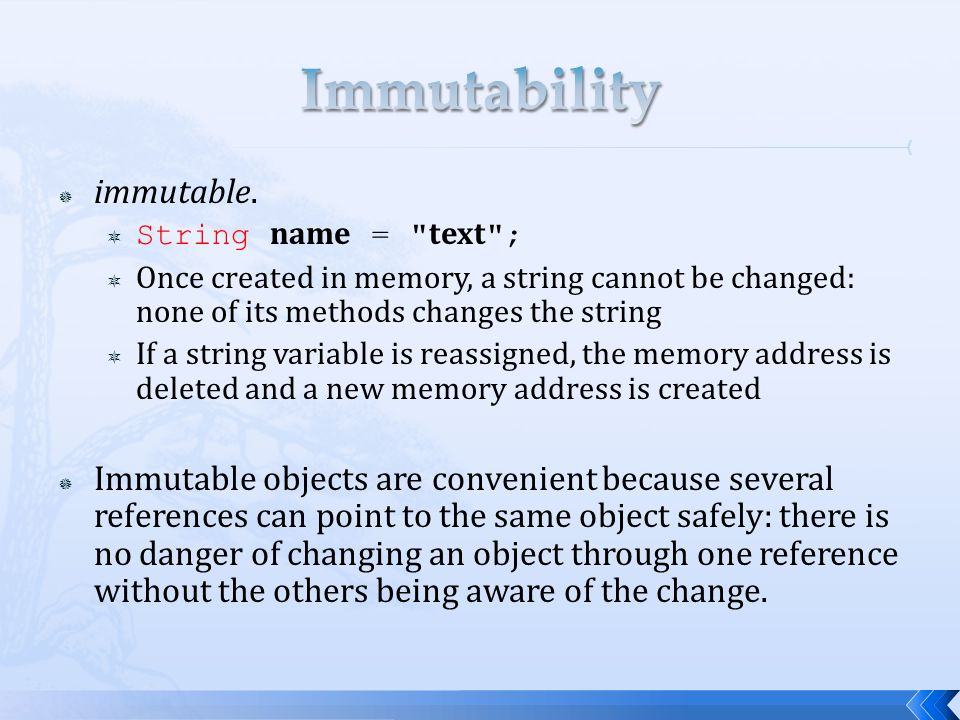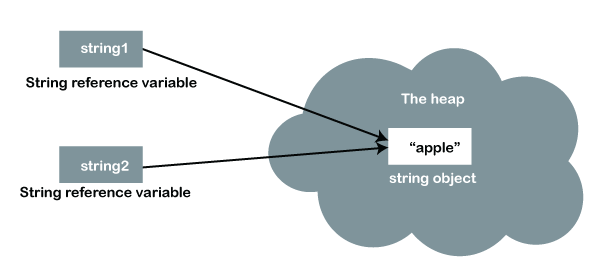Checking Out the Benefits of Immutable Strings in Modern Shows Paradigms
In the realm of modern-day programs standards, the principle of immutable strings stands as a cornerstone of robust software advancement. The benefits they offer go beyond plain convenience; they basically change the way data is handled within applications. By embracing unalterable strings, developers can make certain enhanced data integrity, improved thread safety, simplified debugging processes, increased safety steps, and effective efficiency optimization. These advantages act as a testimony to the profound influence that welcoming immutability can have on the dependability and effectiveness of software systems.
Improved Data Honesty

By preventing the alteration of string things, immutability removes the risk of unintentional changes to the information they hold. This not just improves the security of the information but additionally enhances the integrity of the code that depends on these strings.
Immutability likewise supports more secure multithreading atmospheres, as concurrent accessibility to immutable strings does not posture the danger of information corruption via simultaneous modifications. This property streamlines the process of managing strings in identical shows situations.
Fundamentally, immutability works as a safety shield around the information stored within strings, boosting their honesty by making certain that once specified, their worths stay unchanged throughout the program's execution.

Improved Thread Safety And Security
Immutable strings improve the thread security of programs by making certain that when a string object is produced, its value can not be customized. This residential or commercial property removes the threat of concurrent strings attempting to change the very same string simultaneously, which could lead to information corruption or inconsistent states in the program - Why are strings immutable in Java?. In a multi-threaded setting, where numerous threads accessibility and manipulate information simultaneously, the immutability of strings provides a degree of safety by guaranteeing that the information remains unchanged throughout its lifecycle
Simplified Debugging Processes
Given the enhanced thread safety facilitated by immutable strings, a substantial advantage arises in the realm of streamlined debugging procedures. Immutable strings, once developed, can not be modified, making it simpler to map the flow of data and determine the resource of bugs in a program. This immutability makes certain that strings remain regular throughout the implementation of the program, minimizing the likelihood of unforeseen adjustments that might cause errors.
When debugging with mutable strings, programmers usually encounter problems where a string's worth is modified inadvertently, making it testing to determine the origin of an insect. However, with immutable strings, the information stays the same, permitting designers to concentrate on analyzing the real logic of the code instead of tracking down where and when a string was modified inaccurately.
In addition, immutable strings streamline the debugging procedure by allowing easier reproduction of insects. Given that unalterable strings do not change state, developers can recreate and examine pests more effectively, bring about quicker identification and resolution of problems within the codebase. This streamlined debugging process ultimately contributes to higher software program quality and enhanced overall growth effectiveness.

Enhanced Protection Steps
Enhancing information security and fortifying system honesty, the application of immutable strings in software program applications adds substantially to enhanced protection procedures. Unalterable strings likewise play an important role in stopping usual safety and security vulnerabilities such as barrier overflows and SQL shot strikes, as efforts to control string information at runtime are inherently limited.
Additionally, the immutability of strings improves the predictability of program behavior, making it much easier to verify inputs and prevent unforeseen changes that might jeopardize safety and security. This predictability simplifies the process of auditing and confirming code, making it possible for developers to determine potential protection loopholes a lot more efficiently. Overall, integrating immutable strings into software program development practices not just enhances the toughness and integrity of applications but additionally enhances their resilience against protection hazards.
Reliable Performance Optimization
Structure upon the structure of enhanced safety and security actions accomplished via the use of unalterable strings, a vital see this website aspect to take into consideration in software advancement is reliable efficiency optimization. When managing mutable strings, procedures like concatenation or substring creation typically result in the creation of brand-new string objects, causing memory overhead and boosted processing time. However, with unalterable strings, these procedures can be optimized to enhance efficiency. By enabling strings to remain unchangeable and constant, immutable strings assist in better memory monitoring and caching possibilities, eventually increasing the general performance of the software program.
Immutable strings likewise play a critical role in multithreaded atmospheres by advertising string security. Why are strings immutable in Java?. Considering that unalterable strings can not be changed when produced, they can be shared throughout strings without the danger of unexpected adjustments, lowering the need for synchronization mechanisms and improving concurrency. Moreover, unalterable strings simplify debugging procedures as designers can rely on that a string's worth will remain constant throughout the program's execution, eliminating possible mistakes triggered by mutable state modifications. In conclusion, using unalterable strings not just enhances protection yet also dramatically adds to the effective performance optimization of modern software program systems.
Conclusion
In final thought, the advantages of making use of unalterable strings in contemporary programs standards can not be overemphasized. Enhanced data integrity, boosted thread security, streamlined debugging processes, boosted protection measures, and effective efficiency optimization all add to the total efficiency of shows jobs. By including immutable strings into programs practices, designers can Check Out Your URL take advantage of a much more durable and dependable codebase.
Immutability, an essential feature of strings in shows languages such as Java and Python, guarantees that as soon as a string item is created, it can not be altered or customized.Immutable strings enhance the string safety of programs by ensuring that when a string object is created, its worth can not be customized. Immutable strings also play an essential role in stopping usual security vulnerabilities such as barrier overflows and SQL shot attacks, as efforts to adjust string information at runtime are inherently limited.
By permitting strings to continue to be stable and constant, useful site immutable strings promote far better memory management and caching opportunities, eventually increasing the general effectiveness of the software application.
Unalterable strings simplify debugging processes as designers can trust that a string's worth will certainly remain regular throughout the program's implementation, getting rid of prospective mistakes created by mutable state changes.